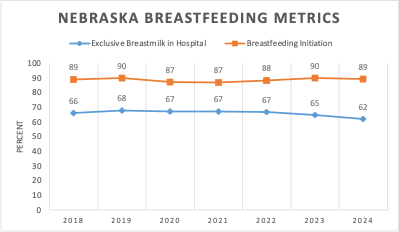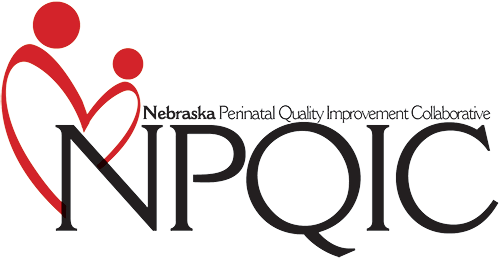Hospital Breastfeeding Practices

With known health benefits for mothers and infants, NPQIC has a quality improvement project to help increase breastfeeding initiation and exclusive breastfeeding rates at all Nebraska birth hospitals.
Statewide NPQIC breastfeeding initiation remained steady at 89% in 2024, while exclusive breastfeeding rates decreased to 62%.
The American Academy of Pediatrics (2022) recommends exclusively breastfeeding for six months and continuing to breastfeed, along with complementary foods, for two years or beyond, aligning with the World Health Organization (WHO). The Centers for Disease Control and Prevention (CDC) and The Joint Commission (TJC) monitor these breastfeeding practices in all US hospitals.
NPQIC strives to assist each birthing facility by sharing hospital resources, improving policies and procedures, and offering guidance to help improve breastfeeding practices across Nebraska. We are utilizing our quarterly reported data and the Nebraska Maternity Practices in Infant Nutrition and Care (mPINC) Survey score to guide our quality improvement efforts.
Go to our interactive dashboard to examine Nebraska's Breastfeeding rates in more detail.
Breastfeeding Education Library
Project Resources
SAMPLE Nursing Staff Breastfeeding Education Competency Checklist (2024)
SAMPLE Breastfeeding Policy (2024)
CDC Breastfeeding Report Card (2022)
AAP Policy Statement: Breastfeeding and the Use of Human Milk (July, 2022)
Academy of Breastfeeding Medicine Protocols
ACOG Committee Opinion No. 756: "Optimizing Support for Breastfeeding as Part of Obstetric Practice" (October, 2018)
Lactation Resources
- Maintained by the U.S. National Library of Medicine (NLM) at the National Institutes of Health (NIH)
- Provides a summary of drug-use during lactation, known drug levels, reports of adverse effects in breastfed infants, effects on lactation, drug alternatives to consider if indicated.
- A service of the Organization of Teratology Information Specialists (OTIS)
- Provides evidence-based information on the safety of medications and other exposures during pregnancy and while breastfeeding.
- Fact-sheets available to print and distribute.
- No-cost information service is available to mothers and health professionals via chat, test, phone and email.
- Available Monday through Friday 8 am-5 pm.
- Toll free: 866-626-6847
- Text: 855-999-3525
- Chat and Email link available on website.
- Web-site and materials available in English and Spanish.
Infant Risk Center (Texas Tech University Health Sciences Center)
- General education about medications and lactation.
- Includes a forum to send questions to Dr. Thomas Hale, author of Medications and Mother's Milk.
Medications and Mothers’ Milk
- Hale, T. W. (2021). Hale's medications & mothers' milk, 2021: A manual of lactational pharmacology (19th ed.). Springer Publishing Company. ISBN 9780826189257.
Briggs Drugs in Pregnancy and Lactation
- Briggs, G. G., Freeman, R. K., Towers, C. V., & Forinash, A. B. (2021). Briggs drugs in pregnancy and lactation: A reference guide to fetal and neonatal risk (12th ed.). Lippincott Williams & Wilkins. ISBN 9781975162375.
- Carolina Global Breastfeeding Institute, UNC Chapel Hill
- An educational program designed to counsel prenatal families about maternity care best practices and the benefits and management of lactation.
- Website can be viewed in Spanish and Arabic
U.S. Breastfeeding Committee

